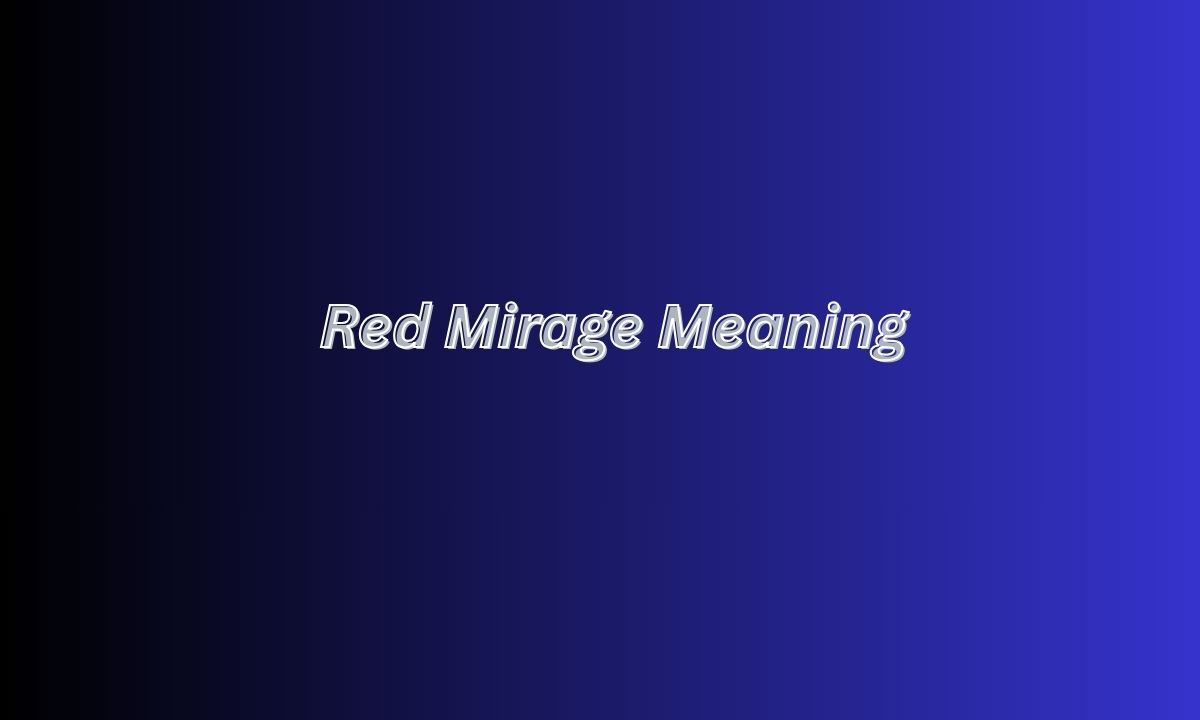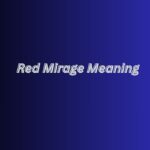The phrase red mirage meaning has surfaced in conversations, articles, and discussions across various contexts, often sparking curiosity about its deeper interpretation. At first glance, the term may seem abstract, yet it carries significant cultural, political, and symbolic weight worth exploring.
Understanding red mirage meaning requires not only an examination of its literal and figurative sense but also an exploration of how language evolves. Much like the concept of a hiatus, it reflects temporary pauses, illusions, or misleading appearances depending on context and usage.
In this article, we will examine the origins, symbolic interpretations, and language-related insights behind red mirage meaning. Readers will also discover polite, professional, and casual alternatives to expressions similar to hiatus meaning, complete with practical examples for different conversational settings.
Red Mirage Meaning
The phrase red mirage typically refers to a situation that looks real or certain at first but later proves to be deceptive. In political contexts, red mirage meaning has been used to describe election results that initially appear to favor one side but shift once all votes are counted. The “mirage” symbolizes illusion, while “red” often reflects urgency, passion, or political symbolism.
However, beyond politics, the expression can be seen as a metaphor for many everyday experiences. A red mirage can describe any situation where early impressions are misleading—whether in personal relationships, career outcomes, or even casual conversations. In language, it serves as a reminder that appearances may not always align with reality.
By analyzing red mirage meaning, we see how phrases capture collective understanding. Just as the word hiatus indicates a pause rather than an ending, red mirage emphasizes an illusion rather than a lasting truth. Both terms highlight temporary states, reinforcing the importance of careful interpretation in communication.
Exploring the Nuance of Hiatus Meaning
The word hiatus commonly refers to a temporary break, pause, or interruption. In literature, it might signal a pause in narration; in work, it can mean time off; and in daily life, it often marks a gap before resuming activity.
When connected to red mirage meaning, hiatus can be seen as a moment of uncertainty—a space where appearances shift and understanding is suspended. Just as a mirage is fleeting, a hiatus suggests something unfinished, waiting to be clarified.
Recognizing alternatives to the word hiatus allows speakers and writers to enrich their vocabulary. Language offers many expressions with slightly different tones, making it easier to adapt communication to formal, casual, or professional contexts.
Polite, Professional, and Casual Alternatives to Hiatus
To enhance language variety, here are 15 alternatives to the word hiatus, each explained with tone and example usage. These help align with the theme of red mirage meaning by showing how temporary states or pauses can be expressed differently.
1. Pause
A simple, neutral alternative for everyday speech.
Example: “Let’s take a brief pause before continuing the discussion.”
2. Break
Casual and versatile, often used in conversations.
Example: “I’m taking a short break from my studies this week.”
3. Interruption
More formal, often used in professional or academic contexts.
Example: “There was a slight interruption in the project timeline.”
4. Interval
Common in performance, meetings, or events.
Example: “The lecture will continue after a short interval.”
5. Recess
Frequently used in education or official sessions.
Example: “The court went into recess for thirty minutes.”
6. Gap
Highlights a temporary space or missing period.
Example: “There’s a gap in my employment history from last year.”
7. Time-out
Casual and conversational, often linked with sports or parenting.
Example: “I need a quick time-out to recharge.”
8. Lull
Carries a poetic or descriptive tone.
Example: “There was a lull in the conversation before she spoke again.”
9. Suspension
More formal, used in work or legal contexts.
Example: “The program is under suspension until further notice.”
10. Sabbatical
Professional, often used in academic or career settings.
Example: “He took a sabbatical year to focus on research.”
11. Interlude
Elegant and slightly artistic in tone.
Example: “The music served as a gentle interlude during the ceremony.”
12. Downtime
Casual, often referring to rest or relaxation.
Example: “I use my downtime to catch up on reading.”
13. Respite
Polite and formal, with a sense of relief.
Example: “The rain provided a welcome respite from the heat.”
14. Adjournment
Professional and legal, indicating a formal pause.
Example: “The meeting ended in adjournment until Monday.”
15. Break in Continuity
A descriptive alternative suitable for academic or technical contexts.
Example: “There was a break in continuity during the recording.”
Choosing the Right Expression
Selecting the best alternative to hiatus depends on tone and context. In casual conversations, words like break or pause feel natural. In professional contexts, recess, sabbatical, or adjournment sound more appropriate. For artistic or descriptive writing, lull or interlude adds sophistication.
The same careful choice applies when using red mirage meaning. Whether one wants to describe a political illusion, a temporary impression, or a symbolic event, precision in wording ensures that the message resonates clearly with the audience.
Red Mirage Meaning in Everyday Use
Outside politics, the idea of a red mirage can be applied metaphorically in daily conversations. For instance, someone might say, “His promise was just a red mirage,” to highlight how initial enthusiasm faded with time.
In professional life, it might describe early results that looked promising but were misleading—“The company’s early growth turned out to be a red mirage.” This captures the illusion of stability where there was only temporary success.
The phrase resonates because it taps into a universal experience: the recognition that first impressions do not always reveal lasting truth. Like a hiatus, it reminds us that language often reflects pauses, illusions, and transitions.
Conclusion
The exploration of red mirage meaning demonstrates how language carries both literal and figurative weight. From politics to everyday speech, it reflects the human tendency to misread temporary situations as permanent truths.
When paired with the idea of hiatus meaning, it shows how temporary gaps or illusions shape communication. Language provides countless alternatives—pause, respite, interlude—allowing speakers to adapt based on tone, politeness, and context.
Ultimately, understanding such expressions equips readers with richer vocabulary, sharper insight, and a deeper appreciation for the nuances of communication. Just as a mirage fades, clarity in language ensures that meaning remains strong and lasting.

Elizabeth crafts heartfelt messages for every occasion—anniversary wishes, love notes, prayers, thank-yous, and inspirational greetings—bringing warmth, joy, and connection to your special moments.










